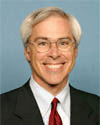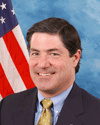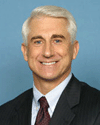New Senate: 51 Democrats 49 Republicans
|
| Dec. 13 | Pickups: | Missouri, Montana, Ohio, Pennsylvania, Rhode Island, Virginia | |
News from the Votemaster
In a surprise upset, Ciro Rodriguez (D) beat incumbent Henry Bonilla (R) in the runoff yesterday in TX-23, one of the districts Tom DeLay gerrymandered. The district is on the Mexican border and probably half the population consists of Mexican Americans. The runoff was cleverly scheduled on a Mexican holiday, presumably in an attempt to discourage Mexican Americans from voting, but they voted in large numbers anyway.
As a result of this election, the Democrats now have 233 seats in the House, more than the Republicans had in 1994; in fact, it is more than the Republicans have had at any time since the President Eisenhower's landslide in 1952.
One seat, FL-13, is still open. As you may recall, this is the district where car dealer Vern Buchanan (R) beat banker Christine Jennings (D) by about 350 votes. The problem is that in Sarasota County, where electronic voting machines were used, 18,000 people voted for other offices but not for Congress. Looks fishy. If the courts don't decide this before the 110th Congress is seated, it will be up to the House to decide what to do here. The options are (1) seat Buchanan and tell Jennings she lost, (2) declare the seat empty and force a special election, or (3) seat Buchanan then immediately expel him and force a special election. Options (2) and (3) have slightly different legal characteristics. Buchanan is the certified winner, so the House may defer to the Florida Secretary of State and formally seat him, but the House unambiguously has the power to expel members by simple majority vote, something it has done in the past.
With the House almost seated, it is time to look forward to 2008. Many House races were close this year and the Democratic wave carried some Democrats to victory in normally Republican districts. You can bet all these will be closely fought in 2008. Nevertheless, incumbents are hard to beat, so a Republican trying to oust a Democrat in a Republican district in 2008 will have to work hard to do it.
Below is a list of House races likely to be top priority in 2008. The basic list was made by adding any race that met either of these criteria:
- The incumbent won by 2% or less in 2006.
- The incumbent is in the other party's territory and did not win convincingly.
The first criterion is clear but the second one needs some explanation. Political analyst Charlie Cook has invented a political index called the Partisan Voting Index (PVI), which measures how a district leans. It is computed by averaging the Democratic vote minus the Republican vote for the last two presidential elections, and then subtracting from this the national average. A rating of D+3 means that the district voted 3% more Democratic than the country as a whole and a rating of R+4 means that it voted 4% more Republican than the country as a whole. Our list includes those districts in which a Democrat occupies a seat in a district with a Republican PVI or vice versa, except that any incumbent who won by 10% or more is considered safe and is not listed. For example, Democrat Chet Edwards (President Bush's own congressman) occupies the House seat in TX-17, which has a PVI of R+18, but Edwards won in 2006 by an 18% margin, so he is considered safe.
On the other hand, Democrat Harry Mitchell won by only 5% in AZ-05, which is R+4, so he is considered at risk.AZ-05
| Incumbent | Challenger | Notes |

Harry Mitchell (D) |

(R) |
Harry Mitchell's victory over J.D. Hayworth was an unexpected upset in a somewhat Republican district. Expect a fight in 2008. |
CA-11
| Incumbent | Challenger | Notes |

Jerry McNerney (D) |

(R) |
McNerny is a newbie to politics and won because the incumbent, Richard Pombo, was the biggest recipient in Congress of money from Jack Abramoff. The district leans Republican and the GOP will fight hard to take it back in 2008.. |
CT-02
| Incumbent | Challenger | Notes |

Joe Courtney (D) |

(R) |
Freshman Joe Courtney won his race by only 91 votes, but as a Democrat in a district with a PVI of D+8, he's probably safe. |
CT-04
| Incumbent | Challenger | Notes |

Christopher Shays (R) |

(D) |
Christopher Shays is the only Republican representative in all of New England and he hung on by the skin of his teeth. Count on the Democrats to try to take back the last Republican seat in New England, and in Democratic Connecticut, they may well succeed. |
FL-13
| Incumbent | Challenger | Notes |

Vern Buchanan (R) |

Christine Jennings (D) |
The winner in 2006 isn't known yet, let alone 2008. This is Katherine Harris district, where there were 18,000 undervotes. The new Congress will probably have to figure out what to do here. |
FL-16
| Incumbent | Challenger | Notes |

Tim Mahoney (D) |

(R) |
FL-16 is Mark "Pedophile" Foley's district. It leans Republican but Mahoney won it because Foley's name was still on the ballot. It won't be in 2008. On the other hand, Mahoney is a conservative Christian and may be able to hold it under his own steam. |
GA-08
| Incumbent | Challenger | Notes |

Jim Marshall (D) |

(R) |
Incumbent Jim Marshall (D) won his race by less than 2% in a district with a PVI of R+8, so he will definitely be targeted in 2008. |
GA-12
| Incumbent | Challenger | Notes |

John Barrow (D) |

(R) |
Incumbent John Barrow (D) won reelection by 864 votes, so the Republicans will go after him in 2008, even though the district has a PVI of D+2. |
IL-08
| Notes | ||

Melissa Bean (D) |

(R) |
Melissa Bean (D) staved off a challenge and was relected by 5%, but the district has a PVI index of R+5, so she will have a fight on her hands next time as well. |
IL-10
| Notes | ||

Mark Kirk (R) |

(D) |
Republican Mark Kirk was reelected by 6% although the district has a PVI rating of D+4, so he always to keep an eye over his shoulder to see who's chasing him. |
IN-02
| Incumbent | Challenger | Notes |

Joe Donnelly (D) |

(R) |
Joe Donnelly defeated Chris Chocola in this somewhat (R+4) Republican district in 2006. He will have to work hard to hold it, but he has a decent chance. |
IN-08
| Incumbent | Challenger | Notes |

Brad Ellsworth (D) |

(R) |
Brad Ellsworth is a blue-dog Democrat, probably the most conservative of the three Democratic pickups in Indiana. He has a good chance of hanging on, but the Republicans will certainly mount a serious challenge given that the district has a PVI of R+9. |
IN-09
| Incumbent | Challenger | Notes |

Baron Hill (D) |

(R) |
Another Democratic pickup, this one in a district with a PVI of R+7. On the other hand, Hill has been elected here before, so he will be tough to unseat. |
KS-02
| Incumbent | Challenger | Notes |

Nancy Boyda (D) |

(R) |
This upset by Democrat Nancy Boyda (D) was completely under the radar. Nobody saw it coming in this R+7 district. But the Democratic wave was just too strong for incumbent Jim Ryun. But the Republicans will surely fight hard to get it back in 2008. |
MN-01
| Incumbent | Challenger | Notes |

Tim Walz (D) |

(R) |
Tim Walz (D) pulled an upset victory here by 6% in a slightly (R+1) district. Given how evenly split the district is, his incumbency may keep him in power in 2008 though. |
NV-03
| Incumbent | Challenger | Notes |

Jon Porter (R) |

(R) |
Jon Porter (R) withstood a challenge from Tessa Hafen, winning by about 4000 votes out of 200,000 cast in this relatively evenly split Clark County district (D+1). But the Democrats are likely to go after him seriously again in 2008. |
NH-01
| Incumbent | Challenger | Notes |

Carol Shea-Porter (D) |
Carol Shea-Porter (D) ran as an antiwar candidate against the Democratic party's choice and won the primary. Then she surprised absolutely everyone by winning the general election. This upset was probably the biggest surprise of the entire election (by 6%). New Hampshire swung wildly into the Democratic column, with John Lynch (D) being relected governor by the widest margin in state history, the Democrats winning both House seats and both houses of the state legislature (for the first time since 1874). The district is fairly closely split, so the power of incumbency might be enough for Shea-Porter to hang on in 2008. |
NM-01
| Incumbent | Challenger | Notes |

Heather Wilson (R) |

(D) |
This was an extraordinarily close race in a swing state. State Attorney General Patricia Madrid (D) lost by only 1000 votes. She may try again in 2008. The district has a PVI of D+2, but Heather Wilson (R) has managed to hang in there time after time. |
NY-19
| Incumbent | Challenger | Notes |

John Hall (D) |

(R) |
Challenger John Hall (D) wasn't expected to win in this Hudson Valley district, but a hugely successful grass roots effort put him over the top by about 2%. The district is R+1, so as an incumbent, he has a good chance of being reelected in 2008. |
NY-20
| Incumbent | Challenger | Notes |

Kirsten Gillibrand (D) |

(R) |
Kirsten Gillibrand pulled of a surprise win in this slightly Republican part of the upper Hudson Valley. Her win was partly due to her opponent, John Sweeney, beating his wife and having her call 911. She won't be able to count on such good luck next time. But next time she will be the incumbent and the power of incumbency may be enough to offset the slight partisan edge (R+3) the Republicans have. |
NY-24
| Incumbent | Challenger | Notes |

Mike Arcuri (D) |

(R) |
This was an open seat in a neutral district. The Republicans shot themselves in the foot by producing an ad accusing Mike Arcuri of calling a sex line and charging it to the taxpayers. While the charge was technically true, it was perfectly clear that he misdialed the number, hung up within 10 seconds, and dialed the number he meant to, which was off by one digit. Arcuri refuted the charge by producing the phone bill showing the two numbers called a few seconds apart. It will be difficult for the Republicans to get this one back, but they will surely try. |
NY-25
| Incumbent | Challenger | Notes |

Jim Walsh (R) |

(D) |
Incumbent Jim Walsh (R) beat back a challenge from Dan Maffei (D) by beating him by just under 4000 votes in this slightly (D+3) Democratic district around Syracuse. |
NC-08
| Incumbent | Challenger | Notes |

Robin Hayes (R) |

(D) |
Incumbent Robin Hayes won this race by under 400 votes against a totally unknown high school teacher. Imagine what will happen if the Democrats run a well-known local politician next time. |
NC-11
| Incumbent | Challenger | Notes |

Heath Shuler (D) |

(R) |
This district is heavily Republican (R+7), but Heath Shuler is a famous football star, which is why he won in the first place. Add to this the power of incumbency, and it will be tough to dislodge him. |
OH-02
| Incumbent | Challenger | Notes |

Jean Schmidt (R) |

(D) |
Although this is one of the most Republican districts in Ohio (R+13), freshman Jean Schmidt defeated physician Victoria Wulsin by fewer than 3000 votes out of 225,000 votes cast. Despite the Republican tilt of the district, with Schmidt doing so badly, the Democrats are likely to go after her again in 2008. |
OH-15
| Incumbent | Challenger | Notes |

Deborah Pryce (R) |

(D) |
The Democrat Mary Jo Kilroy (D) came close to knocking off the 4 person in the Republican leadership, Deborah Pryce (R). Pryce won by only 3500 votes out of 200,000 in this even split district (R+1). The Democrats will go after Pryce again in 2008. |
OH-18
| Incumbent | Challenger | Notes |

Zack Space (D) |

(R) |
OH-18 is a decidedly (R+6) Republican district. The seat was formerly occupied by Bob Ney, who resigned in disgrace, but not before managing to get his favorite candidate to replace him. She was tainted from the start. Next time the Republicans will look for a taint-free candidate. |
PA-04
| Notes | ||

Jason Altmire (D) |

(R) |
Jason Altmire is another surprise winner, as nobody was paying much attention to this district before the election despite is relatively even balance (R+3). In 2008, everyone will be paying attention to it. |
PA-06
| Incumbent | Challenger | Notes |

Jim Gerlach (R) |

(D) |
The incumbent, Jim Gerlach, won an extremely close contest with Lois Murphy, beating her by only 3001 votes. She may well be back next time. |
PA-10
| Incumbent | Challenger | Notes |

Chris Carney (D) |

(R) |
PA-10 is the district whose congressman, Don Sherwood, had a long-running affair with a young Peruvian immigrant 35 years his junior. Then he choked her and she called 911. End of Sherwood. But given the Republican tilt of the district (R+8), the Republicans will try hard to get it back. |
TX-22
| Incumbent | Challenger | Notes |

Nick Lampson (D) |

(R) |
This is Tom DeLay's district. Nick Lampson won, in part, because his opponent had to run a write-in campaign as a result of a court decision that did not allow DeLay to change his residence to Virginia and get off the ballot. Next time Lampson will face a serious challenge in this heavily Republican district. |
TX-23
| Incumbent | Challenger | Notes |

Ciro Rodriguez (D) |

(R) |
Ciro Rodriguez won a surprising upset in a district gerrymandered by Tom DeLay. He'll certainly be a target in this heavily Mexican-American district in 2008. |
WA-08
| Incumbent | Challenger | Notes |

Dave Reichert (R) |

(D) |
Incumbent Dave Reichert (R) beat back a fierce challenge from Microsoft manager Darcy Burner, ultimately winning by 7300 votes out of 250,000 cast. The district, in the eastern Seattle suburbs, leans slightly Democratic (D+2), but that wasn't quite enough to overcome the power of incumbency. |
WI-08
| Incumbent | Challenger | Notes |

Steve Kagen (D) |

(R) |
Steve Kagen is a physician who won a surprising victory in this moderately Republican district (R+4). He'll have to fight hard to hold onto it. |
WY-AL
| Incumbent | Challenger | Notes |

Barbara Cubin (R) |

(D) |
Six-term veteran Barbara Cubin (R) was expected to win a seventh term easily, but she made some offensive remarks during a debate and barely pulled it off, ultimately winning by 0.5%. The Democrats will surely give her a serious challenge in 2008, especially after Gov. Dave Freudenthal (D) got 70% of the vote in his reelection bid. |
Projected New House: 233 Democrats 201 Republicans 1 Tie
Dem pickups: AZ-05 AZ-08 CA-11 CO-07 CT-02 CT-05 FL-16 FL-22 IA-01 IA-02 IN-02 IN-08 IN-09 KS-02 KY-03 MN-01 NC-11 NH-01 NH-02 NY-19 NY-20 NY-24 OH-18 PA-04 PA-07 PA-08 PA-10 TX-22 TX-23 WI-08
GOP pickups:
If you like this site, please announce it to news groups and blogs and tell your friends about it. If you have your own blog, please click on "For bloggers" above.
-- The Votemaster